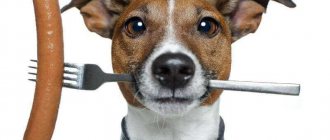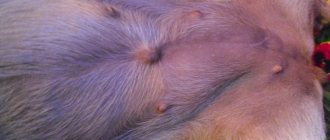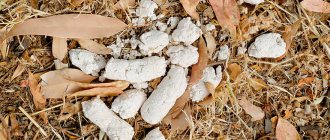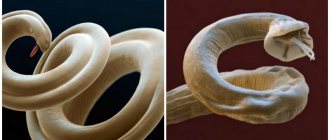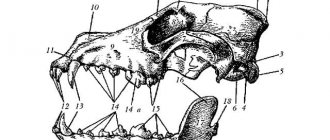Natural causes of constipation in puppies
Constipation is a disorder of the digestive process in which the animal cannot perform a full bowel movement. Partial cessation of bowel function is also considered constipation and can develop for the same reasons.
Digestive disorders are usually divided into natural and pathological. Natural causes can be considered situations that cannot be avoided in the process of growth, disease prevention or other manipulations. If constipation is a complication of any manipulation, the owner should be prepared to eliminate it as soon as possible.
Constipation in suckling puppies very rarely develops if the mother is caring for the babies . Before and after feeding puppies, the dog licks the genital area, which stimulates bowel movements, bowel movements and bladder emptying. In addition, immediately after birth, babies do not feed on milk, but on colostrum, which can be called a mixture of nutrients and gut-friendly bacteria. If for some reason babies do not receive colostrum, digestive problems (constipation, diarrhea) are almost guaranteed as they grow up.
Important! Constipation in a newborn puppy is considered a very dangerous disorder, as it leads to intoxication. Poisoning at such a young age threatens death in a matter of days or hours.
Constipation is most common in puppies that are artificially fed. The reasons are quite predictable: dysbiosis and lack of natural stimulation of the intestines. When artificial feeding, to prevent congestion in the intestines, it is recommended:
- Keep puppies warm and clean.
- Feed babies with a bitch's milk substitute; in case of allergies, with baby hypoallergenic formula "from 0" without additives.
- Massage the abdomen (clockwise) and genital area before and after feeding. The massage should imitate licking, so it is recommended to use a clean cotton sponge dipped in warm water.
Constipation in a small puppy is an unpleasant disorder, causing a lot of doubts and fears. As the baby grows older, he or she faces stress, which is the main cause of constipation.
Constipation is expected in a one-month-old puppy as he transitions from a dairy diet to an adult diet. Regardless of the quality of food and literacy in choosing a diet, the intestinal microflora has to adapt to digesting a completely new type of food. Digestive problems in the form of constipation, diarrhea, flatulence and other disorders will accompany the puppy until his diet expands to an adult (up to about 4 months).
At the age of two months, a new stress awaits the puppy - vaccination. Vaccination involves introducing a weakened virus into the blood of an animal, which cannot pass without leaving a trace. Regardless of the type of vaccination, the immune system and intestinal microflora respond to the introduction of a weakened virus. After vaccination, the puppy may experience a slight increase in temperature and digestive problems: constipation, diarrhea, vomiting.
If the puppy grew up in favorable conditions, from 3 to 5 months it is time for planned parasite prevention. Usually, for the safety of the puppy, products are used that do not kill parasites, but paralyze them. If the baby has a serious infestation or was picked up on the street, delay is fraught with serious intoxication. If there are too many parasites, after death, they can curl up into a lump and clog the intestinal lumen.
Constipation after an anthelmintic is considered an expected consequence and is accompanied by serious intoxication. To avoid complications, before carrying out worming prevention, it is necessary to consult a veterinarian who will prescribe the optimal drug and its dosage. In case of severe infestation, within a few hours after the anthelmintic, it is recommended to give the puppy adsorbents and a laxative.
Causes
Constipation in puppies occurs for the following reasons:
- Feeding orphan puppies with cow's milk or infant formula.
- Abrupt transition from liquid nutrition to solid food at weaning.
- Post-vaccination complications.
- Constipation after deworming.
- Congenital anomaly - megacolon.
- Blockage with an inedible object, trichobezoars.
- Volvulus is a serious condition that, without treatment, ends in death within 24 hours.
Pathological causes of constipation in puppies
Now let's figure out how to understand that a puppy has pathological constipation . The main signs of pathological constipation are dehydration and intoxication.
Important! Dehydration is a dangerous condition, especially in small breed puppies. With a lack of water, the blood thickens, which can lead to congestion in the cardiovascular system.
Dehydration is determined by the condition of the skin and coat. The coat loses its natural shine and the skin becomes less elastic. Intoxication with constipation is accompanied by signs of poisoning:
- Apathy.
- Decreased body temperature.
- Blueness or pallor of the mucous membranes.
- Vomit.
- Refusal of food, despite normal water consumption.
- In case of renal failure - ammonia breathing.
- In case of liver failure - jaundice.
Constipation, which develops due to dehydration, leads to damage to the intestinal walls. Feces become dry and compressed into balls or plugs. In both cases, when moving through the intestines, they scratch its walls. When a dog defecates with dry, dense pellets, we are talking about chronic constipation, which is considered rare for puppies.
Dysbacteriosis is a disorder accompanied by the death of friendly intestinal microflora and its replacement by pathogenic microflora. Not so long ago it was believed that carnivores could not suffer from dysbiosis, but today the situation has changed.
Studies have proven that disorders affecting the intestinal microflora can cause constipation, diarrhea, vitamin deficiency, and distort appetite. As mentioned earlier, dysbiosis is rare in small puppies, but if the babies were artificially fed, were treated for viruses, went hungry for a long time, or suffered a serious helminth infestation, they are guaranteed to have problems with the intestinal microflora.
General information, symptoms
How can you tell if your puppy is constipated? It is believed that a healthy puppy with a normal digestive system should defecate at least two to three times a day . If your puppy has not pooped even once in 24 hours, has become nervous and “twitchy,” and has already experienced problems with defecation (straining and whining during trips to the toilet), then the likelihood of the animal being constipated is very high.
If the pet cannot relieve itself for two days or more, it develops flatulence, the puppy's belly becomes noticeably bloated, it constantly whines and runs to the tray (or asks to go outside). However, a walk does not bring relief to the baby: despite all his efforts and strong efforts, he does not succeed. At best, he squeezes out several dry balls, the surface of which may be covered with mucus or bloody clots. In addition, the baby completely or partially loses his appetite (but thirst remains at the same level or even increases).
Please note that constipation in children contributes to the rapid development of serious intoxication, which has a very bad effect on the condition of the liver and kidneys.
Thus, this pathology is very dangerous, and therefore it is necessary to immediately take all measures to eliminate the problem. We would strongly advise taking your puppy to the vet immediately. It is quite possible that the dog is suffering from constipation caused by some dangerous disease. It may also happen that his condition has no connection with the intestines. For example, with inflammation of the bladder or kidney disease, the manifestations of ailments may be the same.
Foreign objects
Due to their curiosity, puppies quite often swallow inedible objects. If the foreign object has a streamlined shape and does not have sharp corners, it will exit the digestive system naturally. Unfortunately, puppies quite often swallow dangerous objects: needles and threads, Christmas tree tinsel, plastic bags, small parts from children's construction sets, fragments of rubber toys, slivers from sticks.
Any foreign object that gets stuck in the intestinal lumen can cause a blockage. Splinters from the sticks can become embedded in the intestinal wall, causing swelling, inflammation, and physical closure of the lumen. Intestinal blockage is treated with medication or surgery. To confirm the diagnosis and prescribe further therapy, an x-ray with a contrast agent will be required.
Constipation, as a phenomenon, can be a symptom of intestinal volvulus. Unlike blockage, volvulus is a deadly condition that quickly leads to intoxication and sepsis. Regardless of age, with intestinal volvulus, a dog dies within a day at most. The pathology can only be eliminated surgically.
Note! The most common cause of intestinal volvulus is walking or active play immediately after eating.
Megacolon is a congenital disorder that is accompanied by dilation of the large intestine. The disorder occurs during intrauterine development. Puppies suffering from megacolon suffer from constipation from a very early age. Unfortunately, the pathology cannot be treated with medication, but sometimes the situation can be corrected promptly.
First visit to the vet
A big part of caring for a newborn puppy is providing him with help when he needs it. And, as mentioned, your veterinarian can help you learn how to properly feed and help your puppy potty. There are several signs when you may need immediate professional help. If your puppy is coughing, vomiting, crying incessantly, has a runny nose, is unable to go to the toilet with assistance, is experiencing diarrhea, or is simply not eating, you should contact your veterinarian as soon as possible.
However, if the puppies appear healthy, most veterinarians do not need to see them until they are six weeks old. At this point you can start giving him his first vaccinations and deworming.
Traditional methods of treating constipation in puppies
Let us immediately note that first aid at home in the treatment of constipation is relevant if the animal does not suffer from intoxication. It is better to show very young puppies and small breed babies to a veterinarian right away. Self-medication always involves risks, and the main one is wasting time.
Note! Relieving constipation at home is acceptable as long as the puppy continues to eat and drink.
You need to understand that indigestion has several causes, so to eliminate it, you need to use an integrated approach. The first thing you need to do is enrich your puppy’s diet with water. Make sure your baby drinks enough water, especially in hot weather. If a dog is kept on dry food, it must be switched to canned food. Natural feeding is replaced with liquid nutrition: fermented milk products, broths, and so on.
Feeding a newborn puppy
As with newborn babies, mother's milk contains everything your puppy needs to survive and thrive during the first four weeks of life. However, if the puppy's mother is unable to feed him, you should use a dog milk replacer that has been specially formulated for newborns. It is very important to use the correct substitute because some other milk substitutes, including cow's milk, can cause diarrhea. Consult your veterinarian as soon as possible about how to properly feed your newborn puppy, as you may cause him pain if you do it incorrectly.
You should ensure that your puppy is fed every few hours for the first few weeks. After about a month, you can begin to transition to solid foods by adding water and milk to the dry kibble and mixing it into a porridge. Then you can gradually reduce the amount of water and milk, and after about a month (7-8 weeks), you can start feeding the puppy regular food, but only when he is able to eat it himself.
Constipation in newborn puppies
Hello! Please help with advice! The puppy is eight days old today. For the first three days we had diarrhea (it turned out the mother had bad milk). They fed the puppy on bitch milk and he became constipated. When massaging the tummy and anus, the baby pushes hard, but cannot poop. I put suppositories with glycerin, the intestines evacuate (the feces are very hard, almost wooden).
Now for the third day I have been giving my child a lactulose preparation - DUPHALAC (1 ml twice a day). There are no results. My heart can’t stand it and I put candles on once a day. The intestines are emptying (the poop is still very hard, brown in color). I’m very worried, this is not normal. Our veterinarian cannot give any specific advice.
Hello! Please help with advice! The puppy is eight days old today. For the first three days we had diarrhea (it turned out the mother had bad milk). They fed the puppy on bitch milk and he became constipated. When massaging the tummy and anus, the baby pushes hard, but cannot poop. I put suppositories with glycerin, the intestines evacuate (the feces are very hard, almost wooden).
Now for the third day I have been giving my child a lactulose preparation - DUPHALAC (1 ml twice a day). There are no results. My heart can’t stand it and I put candles on once a day. The intestines are emptying (the poop is still very hard, brown in color). I’m very worried, this is not normal. Our veterinarian cannot give any specific advice.
Source
How to help a child with constipation quickly
Constipation is an extremely unpleasant but common problem that can occur at any age, including newborns and preschool children. Therefore, every mother should know how to help a child with constipation. If a child suffers from constipation for a long time, then consultation with a doctor is mandatory. This phenomenon is caused by various reasons, so before taking any action, you need to take a closer look at the child’s condition.
Constipation in infants causes anxiety and crying
First aid for constipation
How you can help a baby with constipation is a pressing question for all young parents. To relieve constipation, pediatricians recommend doing the following:
- apply a warm diaper to your stomach;
- do a massage (with gentle movements with a warm hand, running clockwise over the baby’s tummy) and the “bicycle” exercise;
- give the child glycerin suppositories;
- give laxatives (they should only be used as prescribed by a doctor).
A doctor should be called if the following symptoms are detected in a child:
- decreased appetite;
- refusal to eat;
- flatulence;
- severe abdominal pain;
- frequent vomiting;
- blood in the stool;
- The child’s feces and urine are dark in color with a pungent putrid odor.
If conservative methods of relieving constipation do not help, you can try medications that irritate the intestinal sphincter. In general, it is undesirable to do this, but when the baby is unwell, there is no other choice. In such cases, traditional healers recommend a piece of potato or baby soap. The latter can cause burns, so you need to be extremely careful when using it.
If you don’t have laxative suppositories on hand, you can try “tickling” the baby’s anus with a cotton swab. Before use, lubricate it with vegetable oil or baby cream, then carefully insert a cotton swab inside and gently twist it. After such actions, the child should have a reflex bowel movement. Good results are obtained when using Microlax microenemas. You can buy it at any pharmacy.

